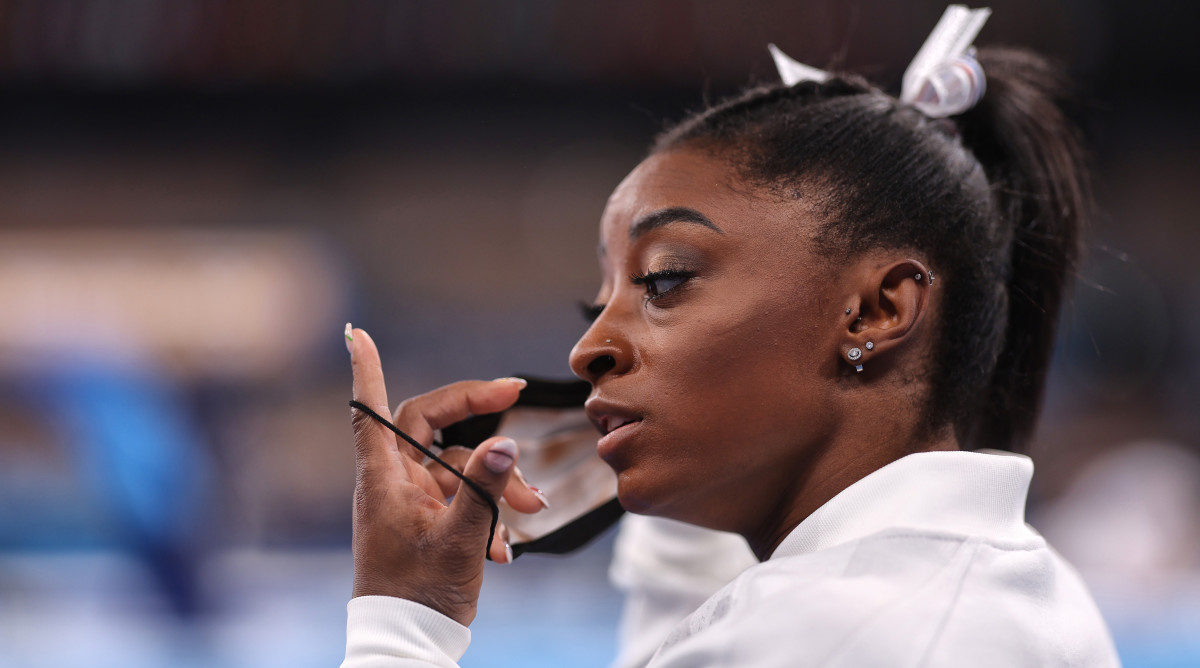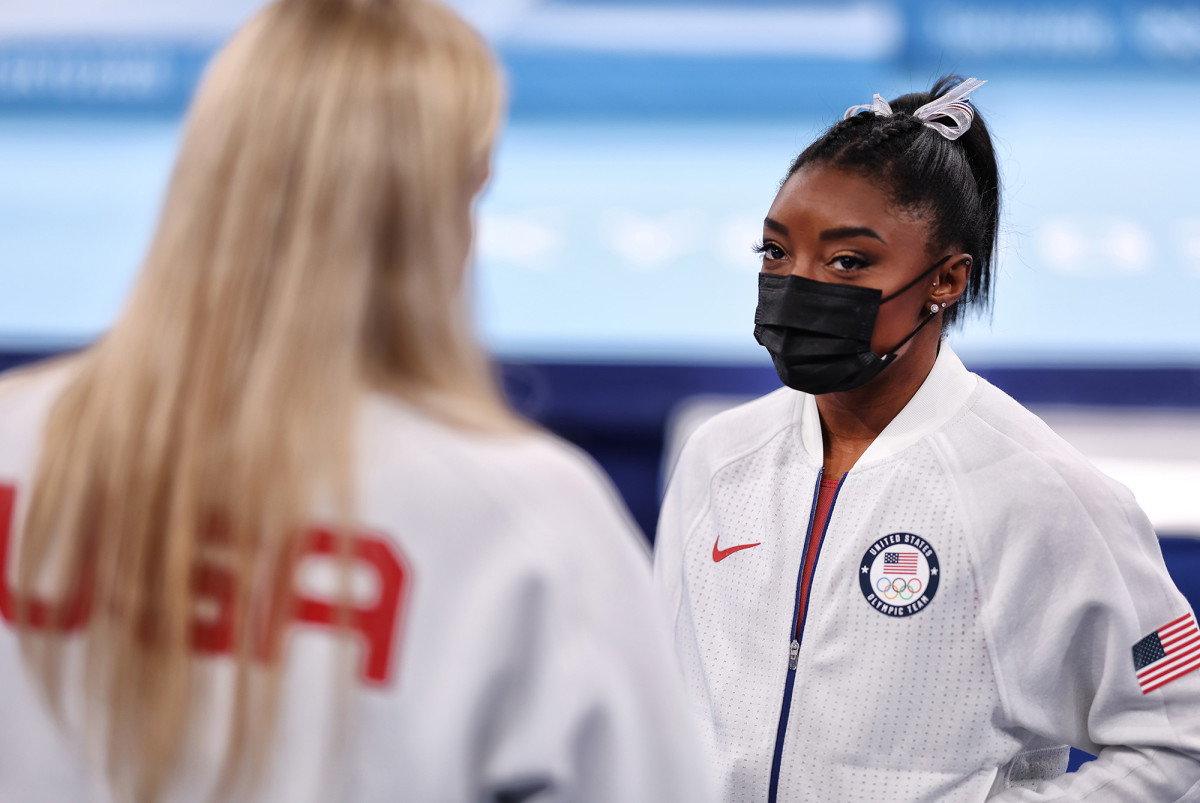Simone Biles Withdrew From Team Final Because She Wasn't in the Right Place Mentally
TOKYO — On Tuesday the greatest gymnast of all time pulled herself from the greatest stage of her career. After one event in the team final, a flubbed vault, Simone Biles told her teammates and coaches that she could not continue. Her status for the rest of the Olympics remains in doubt.
Cameras caught her telling team doctor Marcia Faustin, “I don’t want to do it. I’m done.”
The U.S. took silver without her, falling for the first time in an Olympics or world championship since 2010. In a result once thought unimaginable, Russia won gold, with 169.528 points, to the U.S.’s 166.096. Great Britain earned bronze, with 164.096 points, its first gymnastics medal since 1928.
Biles alternated between tears and laughter afterward. She said she was not physically injured. “I just don’t trust myself as much as I used to,” she said. “I don’t know if it’s age, but I'm a little bit more nervous when I do gymnastics. I feel like I'm also not having as much fun, and I know that”—she began to cry—"this Olympic Games I wanted to do it for myself, and I was still doing it for other people, so that just hurts my heart badly, that doing what I love has been taken away.”

Wanted. She is due to compete in the individual all-around final Thursday. Was her use of the past tense a sign of her intention to withdraw from that as well? She said she plans to “take it a day at a time.”
But she seemed otherwise in good spirits, at times giggling, such as when she was asked about how she chose which vault to do. “Girl, I did not choose to do a one and a half [twist]!” she said. She added, “I had no idea where I was in the air.”
Biles has historically been nearly automatic on the vault. She already has one vault named after her and one of the great dramas of the Games seemed to be whether she would add another, a Yurchenko double pike.
She felt fine Tuesday morning, she said, but she began shaking a few hours before the competition. During warmups, she lost her bearings on a planned Amanar and reduced it to a 1 ½ twist. During competition, she did it again. Her score of 13.766 was the lowest vault figure on either team.
Afterward, she told her coaches that she wanted to withdraw. They assured her that she could do it. “No,” she said. “I know I’m going to be fine, but I can’t risk the medal for the team, so I need to call it.” She added that her skills are so difficult that she risks serious injury if she is not locked in.
“I have to do what’s right for me and focus on my mental health,” she said afterward. “That’s why I decided to take a step back.”
Her teammates said they supported her decision. “We totally understood,” said Jordan Chiles, who replaced her on the uneven bars and the balance beam. “If we were younger, we would’ve been like, No, no, no! But we’re old enough to understand, because we’ve all gone through it ourselves.”

Biles had been shaky during the qualifying round as well. She flew out of bounds on her first vault, and skidded completely off the carpet during her floor exercise. She also took three steps on her balance beam dismount, a mistake high-performance director Tom Forster said he had never seen her make. “The errors we made, I think, are mental,” he said then.
The gymnasts did not speak to the media that day, but in an Instagram post Monday, Biles alluded to the anxiety she feels.
“It wasn’t an easy day or my best but I got through it,” Biles wrote. “I truly do feel like I have the weight of the world on my shoulders at times. I know I brush it off and make it seem like pressure doesn’t affect me but damn sometimes it’s hard hahaha! The Olympics is no joke! BUT I’m happy my family was able to be with me virtually[.] They mean the world to me!”
She had also mentioned concerns to Sports Illustrated in April. “I don’t feel as on top of the world as I did last year,” she said then. “In the gym, since we had that time off, I’ve gotten to think more about skills and kind of given myself, like, I wouldn’t say mental blocks, but it’s definitely different.” Asked how she handled that, she said, “Change the skills.”
That coping mechanism worked in training. But Olympic pressure is a different story.
On Tuesday she became the most overqualified cheerleader in Olympic history. She fetched chalk for her teammates and screamed, “Come on," more begging than celebrating. At one point, it seemed the U.S. could sneak ahead even without her. Suni Lee used the more difficult of her two possible bar routines and hit it perfectly, scoring a career-high 15.400. The U.S. still trailed by 2.5 points, a huge margin.
But the Russians have historically struggled on the beam, perhaps the least forgiving apparatus in a team event because a fall can be fatal. Vladislava Urazova and Angelina Melnikova each toppled off, giving the U.S. the lead by a tenth of a point. Viktoria Listunova landed her routine. That left Chiles, who is normally the most consistent of the group but had fallen off the beam twice during qualifying rounds and been left as a reserve for this event. But as she waited for her turn, she danced to Ed Sheeran’s “Shape of You,” playing over the loudspeaker for the floor routine of Lu Yufei, of China. As Chiles mounted the beam and began to perform, Biles did her routine on the ground alongside her. She hit all the landings. So did Chiles.
When it was over, no one jumped higher than Biles. But Russia held an eight-tenths lead and then pulled away on the floor. Grace McCallum stepped out of bounds with both feet and Chiles fell. The Russians avoided major errors.
Afterward, Biles beamed as she held her medal. It was the sixth medal of her Olympic career. It might be her last.
More Olympic Coverage:
